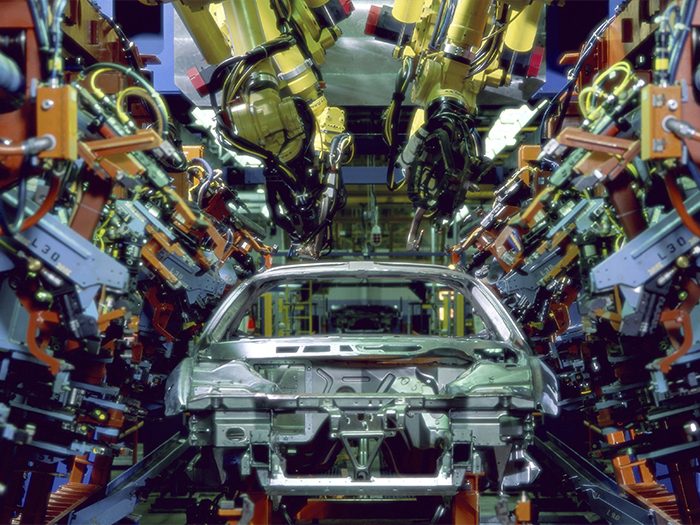7 Critical Risks Facing the Automotive Industry

The once-predictable automotive industry is at an interesting crossroads, facing numerous market-changing risks.
From the push for new technologies, such as self-driving and electric cars, to competition from ride-sharing apps and a decline in foreign-market car sales, it’s no wonder that in June the New York Times declared that “The Car Industry is Under Siege.”
All of these rapid changes mean that automakers will have to step up their game in order to stay ahead of the ever-evolving risks and remain profitable.
Here are seven critical risks the industry is facing right now and for the foreseeable future.
1) Self-Driving Cars
As Tesla promises that over-the-air updates will bring self-driving technology to hundreds of thousands of cars this year, people are right to be concerned about the effects this shift could have on the automotive industry.
Many warn that the push to get self-driving cars on the road as soon as possible could lead to accidents and fatalities, like when a self-driving Uber struck and killed a pedestrian while the back-up driver was watching videos on her phone.
Risk managers and insurance providers should also be wary as self-driving cars are likely to transform our entire transportation system by redesigning public transit, eliminating jobs for truck drivers and reducing the number of car accidents that occur each year.
2) Tariffs
President Donald Trump’s trade war with China has had far-reaching consequences for the automotive industry.
NBC News reports that tariffs on aluminum and steel have already added $240 to the cost of producing a new vehicle. As a result, car prices are beginning to rise and exports are declining.
Despite these already harmful effects, tariffs aren’t going away anytime soon.
Rumor has it, Trump might even add a tariff to imported vehicles and automotive parts, which automakers vocally oppose. Additional tariffs could cost consumers an extra $455 to $6,875 per vehicle, according to a report from The Center for Automotive research. The same report found that these tariffs could drop auto sales by as many as 2 million vehicles.
While the administration decided in May to delay the tariffs for at least six months, tariffs remain a pressing risk for the industry.
3) Ride-sharing and Rental Services
Ride-sharing apps like Uber and Lyft and peer-to-peer car rental companies such as Turo are expected to change the face of car ownership, according to experts at the 2019 Collision Conference in Toronto, Reuters reports.
They cite parking and insurance costs as a major reason why people are turning to car-sharing services instead of purchasing their own cars.
“Your phone will be your car,” Turo CEO Andre Haddad told Reuters. “Many more [people] are realizing they can share their car when they’re not using it or rent it out to recover the big costs of ownership.”
4) Cyber Attacks on Connected Cars
Cars are becoming more technologically connected than ever, with many new models equipped with GPS systems and Bluetooth connectivity.
While those features my make it easier for drivers to stay connected to their phones or get directions on the fly, they also make vehicles more vulnerable to cyber attacks.
In 2015, Fiat Chrysler recalled 1.4 million vehicles after security researchers found a way to disable a car’s brakes and steering wheel through hacking the onboard entertainment system, according to the Washington Post.
The New York Times reported that a security breach that results in a recall could cost automotive companies up to $1.1 billion.
Given that the average car is programmed with more than 150 million lines of computer code, cyber security threats aren’t likely to go away anytime soon.
5) China’s Economic Slowdown
China is the world’s largest auto market by sales, so car makers everywhere should be concerned by the country’s recent economic slowdown, which has led to a decline in auto sales.
According to the Wall Street Journal, June marked the 12th month in a row that auto sales in China declined. Sales are now the lowest they have been in the last three years.
GM reported a 15% drop in sales during the first-half of the year and Ford’s first half sales were down 27% from 2018.
Increasing tension in trade relations between the U.S. and China and new emissions regulations are the likely culprits behind this drop in sales.
6) Automation
It’s no secret that automation is taking over the manufacturing industry.
Automated assembly-lines are largely responsible for the fact that manufacturing jobs, which made up 23% of the economy during the industry’s peak, now only account for about 8% of U.S. jobs. A new study found that “manual workers” were one of the most vulnerable groups in the evolving economy.
Many of these manufacturing jobs were in the automotive industry, so car makers should definitely be concerned about how automation can affect worker layoffs and plant closures.
The lack of manufacturing jobs has been a hot topic politically speaking, with President Trump enacting tariffs and threatening the industry in an effort to bring back American manufacturing jobs.
Even if you ignore potential job losses, automation in the manufacturing industry comes with its own risks. With three million industrial robots expected to be in use in factories around the world by 2020, the automotive industry should be concerned about liability issues if the machines cause product errors.
7) CO2 Emissions Regulations
Given the current administration’s lax attitude towards environmental protections, this category isn’t likely to have a huge effect on the U.S., at least not immediately.
But that doesn’t mean U.S. automakers shouldn’t be concerned about the potential effects of these regulations from abroad could have on their companies. Ford is on track to see up to $6.6 billion in fines for violating European CO2 emissions regulations by 2021 due to car sales in European countries.
The industry has already started to feel the effects of these government regulations. A merger between Fiat Chrysler and the French automaker Renault was thwarted by government demands in France. New emissions rules in China are also a factor in the country’s auto sales decline.
A lack of regulations in the U.S. is equally alarming to automakers. If Trump’s proposed rollbacks on Obama-era regulations go through California and about thirteen other states are likely to sue the federal government in an attempt to enforce their own, strict regulations which could bifurcate the market, according to the New York Times.
As people and governments become more and more concerned about the effects of global climate change, automakers can expect to be more concerned about regulatory risk, which is often tricky, if not impossible, to insure. &








